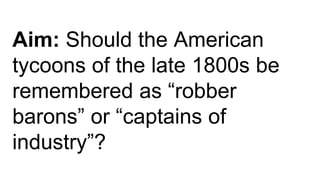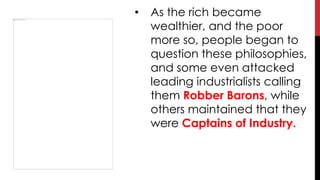Hw#28
- 1. Aim: Should the American tycoons of the late 1800s be remembered as “robber barons” or “captains of industry”?
- 2. Trust: a large business that controls industry. Ex: oil trust Monopoly: having complete control of an industry. Ex: monopoly on steel Industry: the business or manufacturing of a good. Ex: oil industry NEW WAYS OF DOING BUSINESS
- 3. ▪ HOW DID THE GOVERNMENT RESPOND TO THE NEW WAYS OF DOING BUSINESS?
- 4. Laissez-Faire: This was an economic philosophy begun by Adam Smith in his book, Wealth of Nations, that stated that business and the economy would run best with no interference from the government.
- 5. ▪ HOW DID THE AMERICAN SOCIETY RESPOND TO THE NEW WAYS OF DOING BUSINESS?
- 6. The social philosophy known as “Social Darwinism” supported laissez-faire capitalism. • Social Darwinism stated that success in society was determined by "survival of the fittest." This interpretation of Charles Darwin's theory caused many to believe that the poor were lazy, while the rich were honest and hard-working. This also explained how some businesses did well while bad ones went bankrupt.
- 7. • As the rich became wealthier, and the poor more so, people began to question these philosophies, and some even attacked leading industrialists calling them Robber Barons, while others maintained that they were Captains of Industry.
- 8. • Derogatory term applied to 19th century businessmen who people believed used corrupt or exploitative practices to amass great wealth and monopolize economic power. ✓ Tricky Stock Deals ✓ Shady Contracts • A term originating during the British Industrial Revolution to describe business leaders whose means of amassing great wealth contributed positively to the country in some way. ✓ Worker Lockouts ✓ Fraud ✓ Increased Productivity ✓ Providing more Jobs “Robber Baron” “Captain of Industry”
- 9. “Robber Barons vs. Captains of Industry”
- 10. Andrew Carnegie ■ In 1861, at the age of 26, he started up the Freedom Iron Company, and used the new Bessemer process for making steel ■ He formed all of his companies into the Carnegie Steel Company in 1899, which controlled raw materials, manufacturing, storage, and distribution for steel. ■ He used Vertical Integration
- 11. Companies like Carnegie Steel used vertical integration to buy companies in order to gain materials needed to make or deliver their products
- 12. John D. Rockefeller ■ He established one of the first oil refineries ■ 1870—With partners, forms a business trust: Standard Oil ■ At its peak, controls 90% of all oil companies. ■ He used Horizontal Integration
- 13. Companies like Standard Oil used horizontal integration to buy similar companies to reduce competition
- 14. • Born into a wealthy family • Made a lot of money by financing railroad companies that were in financial trouble • In 1901, he bought Carnegie Steel and turned that into U.S. Steel, the world's first billion-dollar corporation • By the early 1900s, Morgan controlled almost all of the major industries in the U.S. and had a large stake in the financial and insurance industries • The Pierpont Morgan Library in New York was donated by Morgan in 1924. J. P. Morgan
- 15. The government used laissez faire policies toward big business… The lack of regulation allowed businesses to become very powerful... Uncle Sam & JP Morgan Rockefeller controlling the White House














